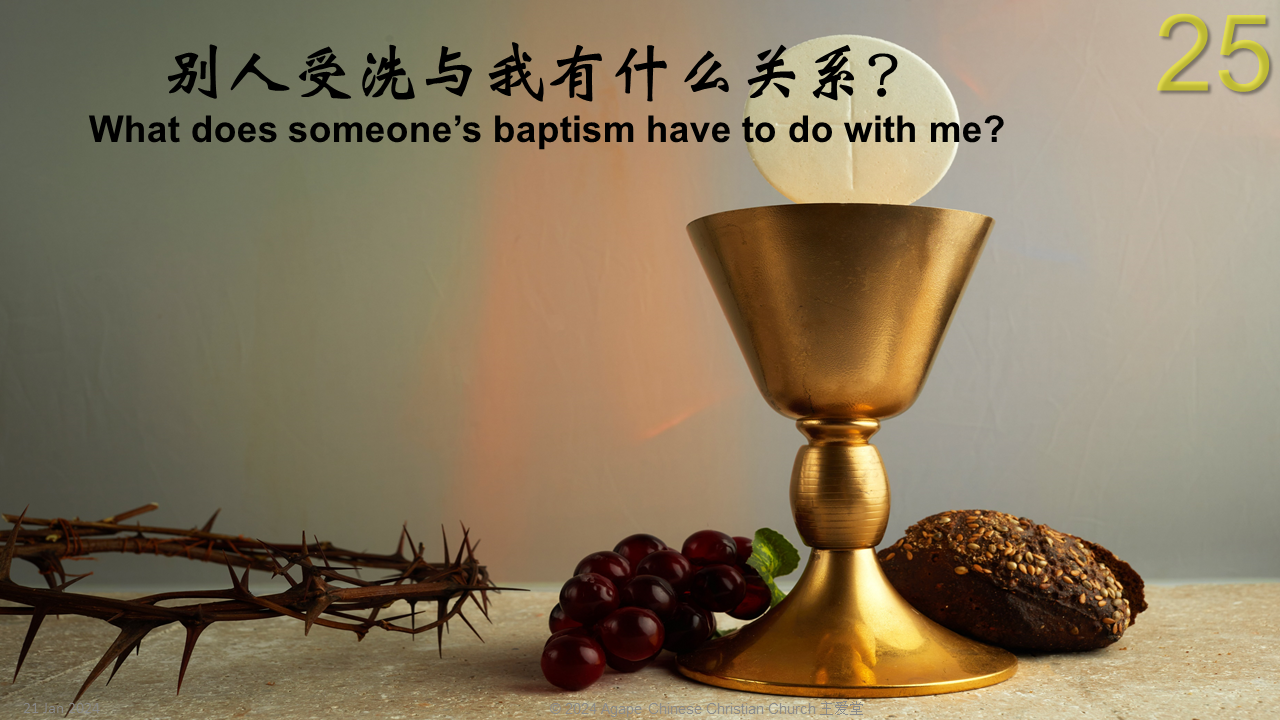别人受洗与我有什么关系?What does someone’s baptism have to do with me?
Remember these points
I put these points at the top of my sermon-prep template to remind myself every week:
- Show that main point of passage relates to Jesus and his saving work
- (1 Cor 1:18) A truly gospel-centred message will not be acceptable in a synagogue or mosque
- Did I proclaim the gospel as the headline news of the sermon, rather than as a “by the way…”?
- Unbelievers are called to repent, believe, and be saved
- Believers are encouraged to abandon their old self, renew their minds, put on the new self in Christ
- Preach simple sermons, so that God’s people can see Christ more clearly and love him more dearly
News
Baptism today!
Hook

The picture is AI-generated. I asked “generate image of college age chinese male and slightly older chinese male,” then refined it a bit with the additional command, “make one of them older.”
A made-up example
Consider the made-up example of 老王 and 小李. This example is adopted from a 9Marks page on baptism.
老王 is married, with 5 kids, the eldest is only 10. They are a Christian family.
小李 is college-aged. Unbeliever. But recently, 老王 and a few others finally got him to accept Christ.
Today is 小李’s baptism.
When the pastor finished the sermon, 老王’s wife went to the Sunday School to pick up their 5 kids. She brought them in to sit with 老王 so that they can watch the baptism.
But the kids were misbehaving, running around and making lots of noise. 老王 couldn’t take it anymore. As they were singing the last verse of the hymn, he decided to leave. The whole family left.
老王 felt a bit bad about leaving early, But he was thinking that 小李’s baptism is entirely between 小李 and the Lord, and 老王 isn’t really part of it; he’s only there to watch and give emotional support. Besides, the kids were really not able to sit still anymore, so why ruin 小李’s baptism?
Discussion
What do you think of 老王’s decision to leave?
Passage

The picture is from Adobe Stock Photos (free license). AI-generated images of today’s topic were just way too weird!


Common attitude of evangelicals towards faith, baptism, and church
Story of 老王 and 小李 is quite common, especially with large churches. With our small church, it’s much less likely for this to happen.
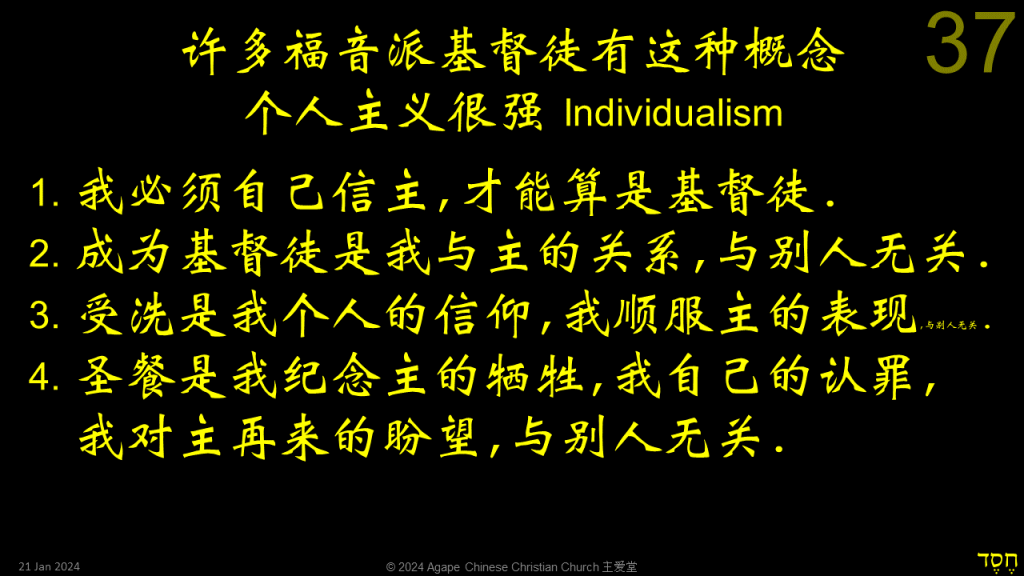
Individualism
Individualism (个人主义 gè rén zhǔ yì) is very strong, especially in Western societies (and increasingly so in Chinese societies as well).
Following are common ways evangelicals look at being a Christian, at baptism, and at Communion:
- I must believe in the Lord, only then can I be called a Christian.
- To become a Christian is between myself and the Lord, nothing to do with others.
- Baptism is a profession of my faith, my obedience to the Lord, nothing to do with others.
- Communion is my remembrance of the Lord’s sacrifice, my own confession of my sins, and my hope in the return of the Lord; again, nothing to do with others.
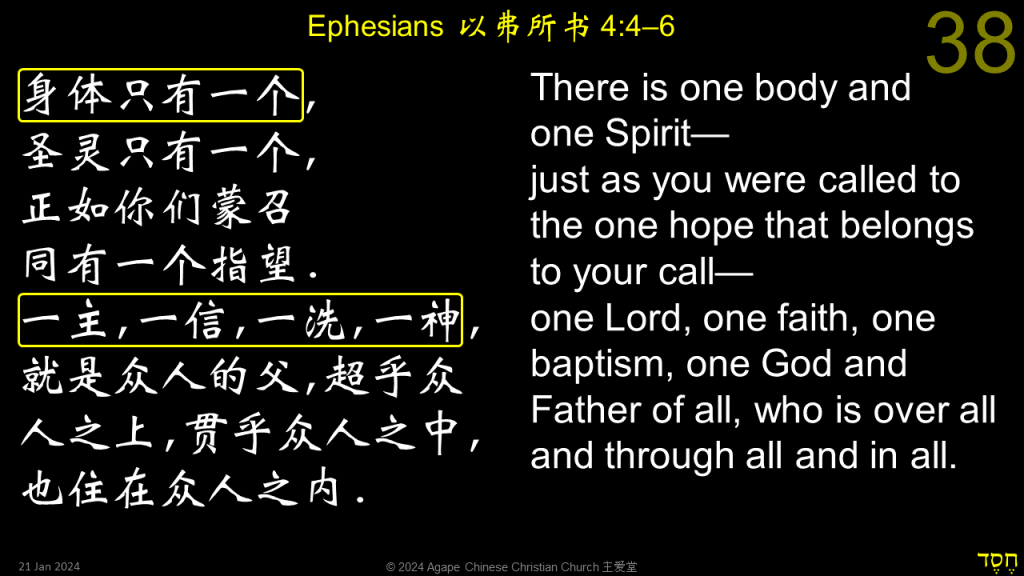
What does the Bible say? Ephesians 4:4-6
One body: There is one universal church. But there is also a local church (like ACCC) to which you belong.
The local church, each congregation, is the representative of that one body.
Whether in the local church, or in the world-wide universal church, we are all joined in one Lord, one faith, one baptism, one God.
The local church, each congregation, is the representative of that one body.

What does the Bible say?
- Through baptism, you announce to the world that you now belong to God.
- You’re a Christian.
- You are citizen’s of the Kingdom of Heaven, you are the Lord’s disciple.
- You join the church (the one that baptised you), and you serve as God’s representative in the embassy here on earth.
- Baptism is conducted by the church:
- The church considers you to be a Christian.
- The church makes a commitment to you, to look after your spiritual growth.
- You’re family now!

What does the Bible say? 1 Cor 12:13–14
Same as in Ephesians, one body.
The local church, each congregation, is the representative of that one body.
肢体 Zhītǐ Members. We’re members of the body, the church. Christ is the head!
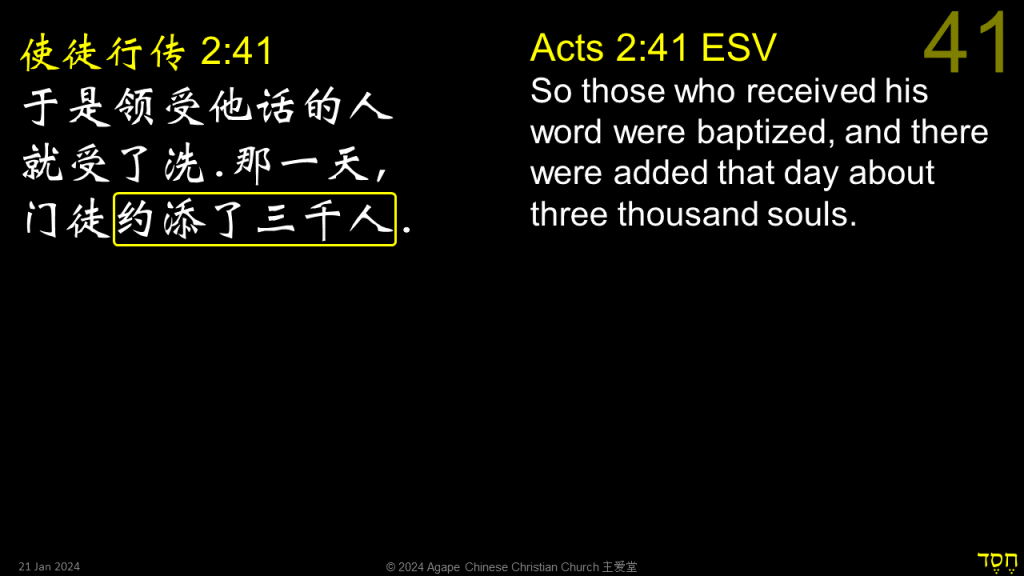
What does the Bible say? Acts 2:41
People believed, were baptised, and added. But added to what? The church!
Everywhere Paul went to preach the gospel, he set up local churches.
Everyone in each city is baptised into the local church.
All the local churches together, from all ages, form the universal church.
So What?
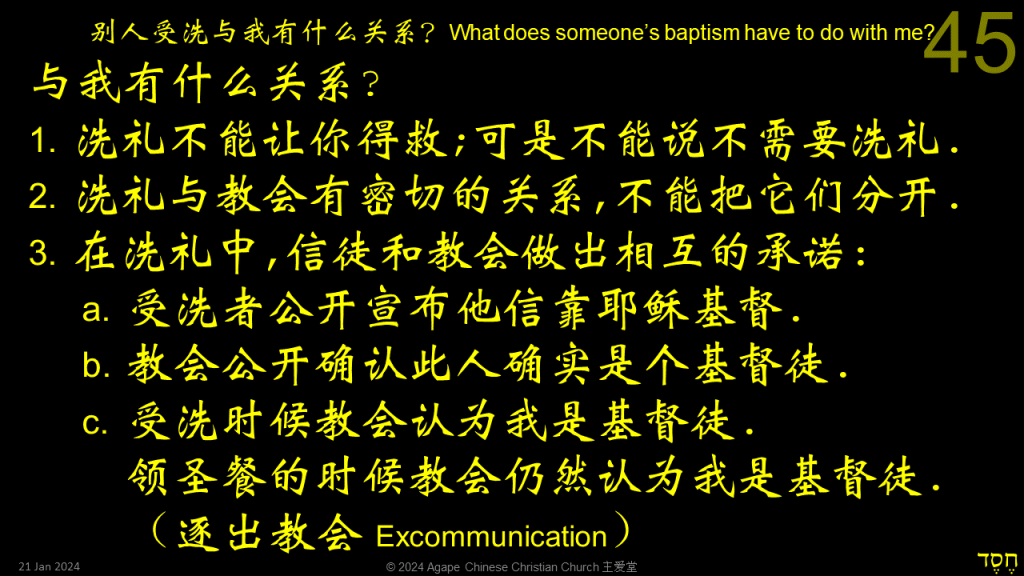
What does this have to do with me?
- Baptism can’t save you (make you right with God); but you can’t say “I don’t have to be baptised.”
- Baptism and the church are intimately connected, we can’t just separate them and say one has nothing much to do with the other.
- In baptism, the Christian and the church made mutual commitments:
- The one being baptised openly announce his or her faith in Jesus Christ.
- The church openly (in front of the congregation and the world) confirm that this person is a Christian.
- When I’m baptised, the church thinks I’m a Christian;
When I take Communion, the church believes I’m still a Christian. - A note about excommunication: not allowed to participate at the Lord’s Supper. This is a form of church discipline.

Note to WHY
- Today you’re getting baptised.
- We welcome you into the church, into God’s family.
- We are committed to be with you in your spiritual growth as a disciple of our Lord Jesus Christ.

